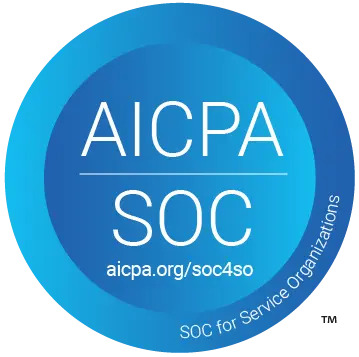System and Organizational Control (SOC) Reporting Services
As your business grows, clearly demonstrating the security and reliability of your systems becomes essential.


Customers trust you with their data, SOC reports help you show you're effectively managing risks and protecting that trust. We work closely with you to understand your unique business needs, ensuring our audits aren't just about checking boxes—they're about helping you build trust and strengthen relationships with your customers.
Security & Compliance
Ensure your customers that your systems meet appropriate regulatory and industry standards.
Independent Assurance
Provide customers and stakeholders with verified audit results.
Client Trust
Demonstrate your commitment to security and operational excellence.
Business Growth
Leverage SOC reporting to improve vendor relationships and partnerships.
SOC Reporting - From Obstacle to Opportunity
Compliance Opens Doors
29% of companies have lost deals because they lacked a required security assessment. In this market, security isn't just IT’s problem, it’s also a sales enablement stragegy.
Onboarding Gets Faster
SOC 2 compliant vendors cut onboarding time by about 30%. That means fewer delays, fewer follow-ups, and faster time to revenue.
The Risk Chain Runs Deep
38% of third-party breaches are caused by a fourth-party (your vendor’s vendor). SOC 2 gives your customers confidence that you’re not passing the buck.
Need to build more trust with your customers?
SOC Reporting and other attestation services:
- Offer valuable insights to strengthen your organization’s control environment.
- Provide clear, controls based reporting to build trust with customers and stakeholders.
- Demonstrate the effectiveness of controls in securing systems and data, ensuring availability, confidentiality, processing integrity, and privacy.
Build Third-Party Confidence with SOC Reporting
System and Organization Controls (SOC) reports help build trust in your internal controls. Partnering up with Sage Audits, an independent CPA firm, allows us to work with your teams to provide an assurance letter over the applicable internal control environment covering your service offerings. The resulting SOC Report that gets issued over the assessment, help provide your customers with enhance transparency, strengthen data protection, and increase stakeholder confidence in outsourced processes. Learn more about our firm
A SOC readiness assessment is recommended for organizations going through their first audit or those that have made recent changes to their environment. This step helps identify what systems and services are in scope, how your internal controls align with the Trust Services Criteria, and where documentation or processes may need improvement. The readiness process helps set the foundation for a smooth and successful audit experience.
As part of a readiness assessment, Sage Audits will:
- Review policies, procedures, and documentation related to your system and services.
- Help define system boundaries and determine the appropriate scope for the engagement.
- Align current control activities with the Trust Services Criteria (for SOC 2) or defined control objectives (for SOC 1).
- Conduct interviews with control owners to understand how your environment is actually managed.
- Identify gaps, weak spots, or missing evidence that could affect audit readiness.
- Provide guidance on drafting the system description that will be included in your SOC report.
- Deliver a control listing with status indicators and practical remediation suggestions, so you know exactly where you stand.
This phase is collaborative and consultative. It usually takes 4 to 8 weeks and gives you a clear roadmap toward a successful audit. If your organization needs help preparing internally or validating that your documentation meets the standard, a readiness assessment is the right place to start. Learn more about our phased audit approach for SOC assurance.
If your organization handles financial data or provides services that affect your clients' financial reporting, a SOC 1 report offers independent assurance over your Internal Controls over Financial Reporting (ICFR). It helps build confidence with customers, auditors, and regulators by showing that your controls are well-designed and working effectively to address financial reporting risks.
SOC 1 reports are especially relevant for service providers involved in financial transactions, payroll processing, loan servicing, or any activity that influences a client’s financial reporting. These reports give user organizations and their auditors clear visibility into your internal controls so they can better assess their own risk and compliance needs.
During a SOC 1 examination, management describes the controls in place to meet specific control objectives. A CPA firm then independently tests those controls and issues an opinion on whether they are operating effectively. Unlike SOC 2, which is based on standard Trust Services Criteria, SOC 1 reports are tailored to the organization’s unique financial control objectives.
Obtaining a SOC 1 report shows that your organization takes financial reporting seriously, operates with integrity, and supports the compliance needs of your clients and stakeholders.
For organizations handling sensitive customer data, a SOC 2 report is often required to demonstrate robust security, compliance, and risk management. This report provides assurance to customers, investors, and other stakeholders that your internal controls effectively safeguard information and meet industry standards.
SOC 2 engagements are conducted under the AICPA’s SSAE No. 18 / 21 / 23 and future subsequent standadards and assess controls based on the Trust Services Criteria (TSC), which include security, availability, processing integrity, confidentiality, and privacy. These criteria help evaluate whether your systems are secure, reliable, and compliant with regulatory expectations.
Unlike SOC 1, which focuses on financial reporting, SOC 2 is tailored to a wide range of service organizations that manage sensitive data, including cloud providers, SaaS companies, and IT service firms.
Each SOC 2 report includes:
- A detailed review of your internal controls related to the selected Trust Services Criteria.
- An independent CPA firm’s opinion on the effectiveness of these controls.
- Optional coverage of additional compliance frameworks to align with industry specific requirements.
By obtaining a SOC 2 report, your organization enhances credibility, strengthens customer trust, and its a tool that tells a story to your clients over how the system works. It shows you are compliant with applicable security and data protection practices that your customers may require.
In some cases, organizations require independent verification of specific processes, transactions, or controls without the need for a full audit or attestation report. Agreed Upon Procedures (AUP) engagements, performed under the AICPA’s AT-C Sections 215 and compliance based under AT-C 315, provide a flexible, customized approach to meeting these needs.
An AUP report provides findings based on procedures agreed upon by the client and stakeholders. Unlike audits, AUP engagements do not provide an opinion or assurance but instead offer detailed, objective reporting that allows decision-makers to evaluate specific areas of concern.
AUP engagements are commonly used for:
- Regulatory compliance verification
- Financial statement or internal control testing
- Due diligence procedures for mergers and acquisitions
- Grant compliance and funding use verification
- Third-party contract compliance reviews
By engaging in an AUP examination, organizations gain independent, fact-based insights tailored to their specific needs. This type of reporting is especially valuable for organizations needing transparency and accountability without requiring a full audit.
Looking for a SOC 2 Audit Firm?
Sage Audits LLP is an independent US-Based CPA firm that provides SOC 2 assurance reports. We deliver third-party audit opinions that help you build trust with your customers and business partners.
Contact us to learn moreRethinking the IT Audit Experience
Focused on IT Assurance
From SOC 1, 2, and 3 to SOX, our niche is IT audit. We understand risk, controls, and how to make compliance work for you.
Real World Expertise
With experience across Big Four firms and in-house internal audit roles, our team understands audits from both sides. We combine technical certification with practical insight to guide clients through complex frameworks. Meet the team →
Built for Business
We don’t believe in cookie cutter compliance. Each IT system is different and folks have different processes and procedures depending on the risks to their business and industry. Our audit process is designed around your operations, timelines, and goals, because efficient audits begin with alignment. See how it works →
Client First Approach
Our assurance services help you gain insight into your current security posture and build confidence in how you present it to stakeholders. We are using technology to help streamline and improve the process without sacrificing quality.